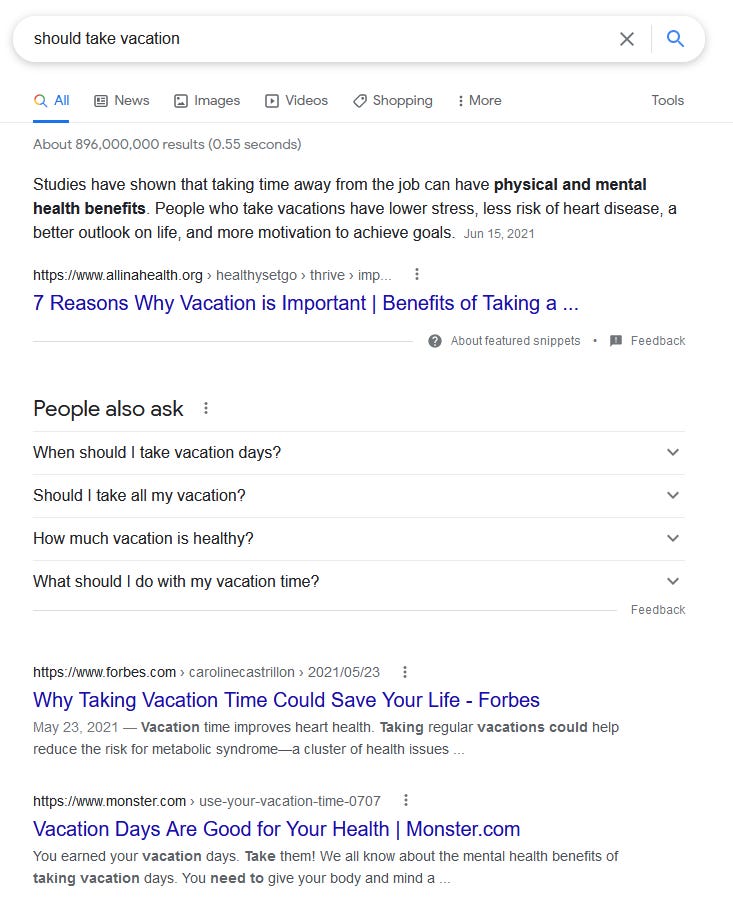
Guess what, this vacation post was inspired by… me going on vacation for the first time since pandemic. So forgive it being on the short side because I disconnected from my usual monitoring of data related chatter and work to spend a many hours driving around chasing waterfalls.
For many years, I came out the other end of a vacation with the same sentiment. “I suck at vacationing.”
This was for primarily two reasons. One was, I had packed so much travel/activity/whatever into the week or so I gave myself, that I’d be exhausted from all the activity and have no time to recover. But the other part was perhaps more insidious — I never felt like I got anything from the vacation.
I’ll take a moment to unpack that previous sentence a bit. It’s loaded with all sorts of madness. Americans in general have a pretty unhealthy view of vacation. For many, if they have any vacation available at all, two weeks out of a year is all we get. Plus there are people who never take any vacation and can be proud of that fact.
Over time, and only in the most recent decade or so, society has slowly tried to shift the perception of vacation. Come summer every year, there are piles of articles posted on the internet about how people should take vacation. They give all sorts of reasons like how its correlated with better health, creativity, lower stress, etc. Instead of linking to them, you can see various examples in the screenshot below.
It’s almost like propaganda to get people to take their vacation since there’s so much of it relentlessly pushing from multiple angles. But if you think about it, it’s quite perverse because they’re inevitably framed as a transaction. Take vacation because it’ll help you work better in the future (wait, what?). It’ll help you rest, make you more creative, it’ll help delay capitalism from killing you as quickly! Do this vacation thing because you’ll get [some benefit] out of it!
Well, if you buy into this bizarre transactional viewpoint about vacation and resting in general, then when you come out the other end of a break and don’t feel rested, or more creative, or whatever, that sounds like a failure.
To make things worse, I wasn’t consciously looking for any specific “thing”, but had internalized some version it and knew that vacation was supposed to benefit me somehow, in some way. But whatever I was supposed to get, it didn’t seem to be happening. I’d just be home, in need of a long nap, and having a mountain of emails to sift through in the morning. UGH.
But with age and experience, I got “better” at vacationing. I managed to forget about all the benefits that I never seem to get anyways. There was one thing I could get guaranteed from every vacation — I get a bunch of days where I can say no to practically any explosions that may or may not be occurring at work.
How I accepted being a cog and learned to love it
The power to being able to say no to anything for a week or two and not think about any potential explosions came from doing two things.
First was easy — preparation.
I have enough of a sense of what needs to be done in the future to know if there are going to be any issues that need my attention. If something is at risk of interfering with my vacation, I do what I can to mitigate or reschedule things. It’s possible to head off a large amount of potential headache from doing this alone, (assuming you can see ahead into the future a couple of weeks).
Getting enough of my work life in order so that I could predict future workload took some doing, of course. It took being able to keep my head above water long enough to see what was coming down the pipeline. Part of that comes from experience, a lot of it came from learning how to push my managers and stakeholders for visibility into the future.
The harder one, but probably more important for my career, is learning to accept that I’m merely one cog in a big organization, whether it’s a 50-person startup, or a giant megacorp. And as someone who can ultimately be replaced for any reason, at any time, the organization is supposed to be designed to be able to withstand me being arbitrarily removed at any point, with or without a replacement handy. That’s a how organizations can persist over time.
At the start, that dehumanizing aspect seems like a negative thing. But the flip side of the argument is that if everything DID fall apart if I so much as take a day off, then I’d never be able to go on vacation, nor can I ever be promoted to another position. I’d still be a cog, but one that’s permanently stuck in place.
So the ideal situation is to treat my work life like any of the data pipelines I set up. Processes need to be polished to the point where I don’t have to babysit them (like a proper automated pipeline should), while the high-touch ones should be safely paused and taken offline for when I’m around.
Vacations have become an semi-regular time where a self-imposed forcing function makes me take stock of my process situation. Have I made it so that people who rely on me know where to go when I’m not around? Is there any way they can help themselves? Do they know what problems they should be solving on their own, and what should wait until I get back?
At first teams might not be in a good place to handle being left to their own devices for a time. But when you work with them over time and slowly teach people when to come to you (or not), they’ll eventually get there. It feels really nice when you realize they’ve gotten to that point.
And it feels EXTRA nice to be able to say “Okay everyone, I’ll be gone for a week, you know what to do.”
About this newsletter
I’m Randy Au, currently a Quantitative UX researcher, former data analyst, and general-purpose data and tech nerd. The Counting Stuff newsletter is a weekly data/tech blog about the less-than-sexy aspects about data science, UX research and tech. With occasional excursions into other fun topics.
All photos/drawings used are taken/created by Randy unless otherwise noted.
Supporting this newsletter:
This newsletter is free, share it with your friends without guilt! But if you like the content and want to send some love, here’s some options:
Tweet me - Comments and questions are always welcome, they often inspire new posts
A small one-time donation at Ko-fi - Thanks to the folks who occasionally send a donation! I see the comments and read each one. I haven’t figured out a polite way of responding yet because distributed systems are hard. But it’s very appreciated!!!





